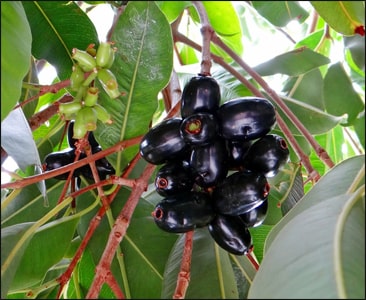Jamun (Syzygium cumini) - Properties, Benefits, Uses & Dosage

Description of Plant
Jamun is slow growing tree, medium to large sized up to height of 30mt and can live up to 100 years or more. At the upper parts of tree bark is light greyish and smooth, at the base of tree bark becomes dark grey and rough. Wood of this tree is water resistant. Leaves are aromatic and have soothing aroma. Young pinkish leaves are changing into leathery, glossy and dark green with a yellow colored midrib. Leaves contain rich nutritional value, offers dense shade and used as foliage for animals. Flowers of this tree are very tiny, white colored and aromatic about 5mm in diameter. Flowering of this tree starts from March to April. Fruits are ovoid shaped, large berries, unripe fruit is green changes to pink and finally it changes to dark crimson after ripening. Its fruit has special property to color tongue purple and fruit is sweet, sour and astringent in taste.
General Information
Jamun, jambolan, black plum, java plum and jambul all are common names of jamun and it is humble fruit with minimum calories. It is seasonal and nutritious fruit with unique shape and color available throughout Asia in abundance. Jamun is delicious plum like fruit that is very rich in iron, vitamin A and vitamin C. Fruit is eaten like healthy snacks in various parts of world. Sweet and tangy flavor of this fruit is really good. In Ayurvedic medicine system fruits, seeds, bark and leaves are used to treat various serious ailments. Jamun is richest source of anti-oxidants and it is fully loaded with flavonoids that is very essential for overall body health.
Jamun is also called "Fruit of God" and it has vast significance in Hindu religion and mythology.
Habitat
Evergreen tropical tree of jamun is native to Indian subcontinent and adjoining parts of Southeast Asia. This species is distributed all over Bangladesh, Pakistan, Nepal, Sri Lanka, Malaysia, Philippines and Indonesia.
Classification
- Kingdom - Plantae
- Order - Myrtales
- Family - Myrtaceae
Names
- Latin name - Syzygium cumini
- English name - Java plum, Black plum
- Hindi name - Jamun, Jambol, Jambul
- Bengali name - Kala jam
- Punjabi name - Jamalu
- Telugu name - Neredu, Chettu
- Tamil name - Saval naval
- Malayalam name - Naval
- Kannada name - Nerale
Ayurvedic Properties
| Hindi / Sanskrit | English | ||
| Rasa | Kashaya, Madhur, Amla | Taste | Astringent, Sweet, Sour |
| Guna | Laghu, Ruksha | Physical Property | Light, Dry |
| Virya | Sheet | Potency | Cold |
| Vipaka | Katu | Metabolic Property (After Digestion) |
Pungent |
Effects on Doshas
It balances pitta and Kapha doshas.
| Charak Samhita | Sushrut Samhita and Vagbhata |
|
Nyagrodhadi gan |
Practical Uses of Syzygium Cumini
- Jamun fruit works miraculously in diabetes. It is wonderful medicine for the sufferers of hyperglycemia. Because it's low glycemic index maintains proper sugar level in human body.
- This fruit is rich in iron and richness of iron makes it a natural blood purifier as it ensures proper blood supply of oxygenated blood throughout body.
- It is good source of vitamin A and C and is very beneficial for overall health of eye and skin. Astringent property of this herb makes skin healthy, glowing and free from acne and pimple.
- Jamun contains various chemical compounds like oxalic acid, gallic acid etc. which makes this fruit capable to fight against malaria and various other microbial and bacterial infections.
- It protects our body from the harmful effects of free radicals that are main cause of cardiovascular disorders and good for overall heart health.
- This fruit is used for digestive system related problems like flatulence, abdominal pain and dysentery.
- It is also used for the treatment of lung & other problems like cough, asthma and bronchitis.
- This herb is aphrodisiac in nature and is used as tonic to generalize weakness, treating anemia and to improve sexual weakness.
- Jamun bark is very effective for the females suffering with leucorrhea.
- It is also very beneficial for depression, exhaustion and other nervous system related disorders.
- This herb is also beneficial in strengthening teeth and gums.
- Jamun in combination with other herbs is used for the treatment of constipation and also helpful in pancreas related ailments.
- This herb is also very beneficial in mouth ulcers and sore throat.
- It pacifies kapha and pitta dosha but aggravates vata dosha.
Part Used
- Seeds
- Leaf
- Bark
- Fruit

